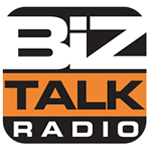
Recently, xTuple co-hosted a roadshow in Texas with long-time partner Larry Cartee of Magical Custom Programming. While in Houston, I was invited to a radio interview with The Price of Business to talk about the latest in business management technologies and what they can do for a company's bottom line. The show, which is the longest running business program in Houston, Texas, is on Bloomberg’s home (Business Talk 1110 AM KTEK) and is also broadcast on numerous national media sites.
 I spoke with host Kevin Price who, in addition to his syndicated radio and TV shows on the BizTV and Biz Talk Radio networks, is a nationally syndicated columnist, author, and editor on several news sites. Kevin is also the publisher and editor-in-chief of US Daily Review. He is also editor-at-large for USA Business Radio and is a frequent guest on major media including Fox News, Fox Business and other networks.
I spoke with host Kevin Price who, in addition to his syndicated radio and TV shows on the BizTV and Biz Talk Radio networks, is a nationally syndicated columnist, author, and editor on several news sites. Kevin is also the publisher and editor-in-chief of US Daily Review. He is also editor-at-large for USA Business Radio and is a frequent guest on major media including Fox News, Fox Business and other networks.
You can listen to my interview on The Price of Business via SoundCloud. But the best way to "listen" is to read the transcript below.
Announcer: Here it comes! From the fabulous penthouse studios of business 1110 KTEK, this is the Price is Right…I mean, this is The Price of Business! Author of the hugely influential “Empowerment to the People,” award winning, nationally syndicated columnist, Kevin Price brings a fresh perspective to business news and the events that shape our lives. And now here’s the star of The Price of Business, Kevin Price!
Kevin Price: Good Morning, I am Kevin Price. So happy to be with you to talk about you and your business. I’ve spent some time with Wally Tonra, and he’s with a company called xTuple.com. That’s x-T-u-p-l-e.com, and you’re vice president of sales for that company, and it’s Enterprise Resource Planning software, which is ERP. Can you kind of give us a brief overview of what that means and what that matters to businesses?
Wally Tonra: Sure, thanks Kevin. So, Enterprise Resource Planning is really a broad category. It's really all business software. It's kind of anything you might need to run a business. You think of things like billing a customer, so you send an invoice which turns into accounts receivable. You think of purchasing items from vendors, so you have to do purchase orders which turns into accounts payable and feeding into the general ledger. And all kinds of information feeding into that general ledger, so that you can do financial reporting to your customer or to your owner's or various constituencies and reporting to your bank and those kinds of things. So that’s kind of the core of what it does or what it has always done. Today it's really expanded to do a whole lot more things like customer service type activities and sales force management activities. We as a company, xTuple has been integrating a whole lot more with Web technologies recently. So people that have some type of presence on the Web, a website, a customer service portal, those kinds of things, [are] also integrating with those kinds of systems. So it’s a pretty broad spectrum of software, but it really kind of, the category is business software, anything to run a business.
Kevin: Yea, very good. Tell me a little bit about the type of businesses, the vertical that you primarily are working in.
Wally: Well, our company tends to target companies that have inventory issues. So an inventory-centric business would be like a manufacturing company or a distribution company, a wholesale distributor, so those kinds of businesses that are generally B2B-oriented, meaning one business selling to another. And they have some kind of inventory issues, we do very well at helping businesses manage inventories to make sure that you’ve got the right product on hand to deliver to customers, make sure you can be responsive to customers, and make sure you are not having too much inventory. So that kind of optimal mix of managing the business correctly. Size-wise, we tend to work with small- to medium-sized businesses, so anywhere from a business maybe $5 million to $10 million on the low side, all the way up to $50 million to $75 million dollar kinds of businesses with several hundred people, but in that category of small to medium-sized business.
Kevin: Obviously robust small to mid-market or almost mid-market.
Wally: Sure, mid-market, yeah.
Kevin: So, you use the term “enterprise,” even to many which obviously throws people — a lot of people [into the categroy] - when you think of enterprise, you think of a lot of those companies out there. Talk about that word usage in this context.
Wally: Well, it certainly is. Lots of smaller companies think that in order to have this kind of software, they need to have an enterprise kind of budget, a large company budget. The mission of our business has always been - we want to take the kinds of business applications that have been available for many, many years — or decades really — to larger businesses, scale them down, and make them more accessible to a smaller company… so that when they grow [and] they outgrow something like QuickBooks — because that’s what you started with because that was easy — you need to go to the next thing. A solution like ours is a whole lot more accessible than a traditional enterprise kind of solution. The word really just means all facets of the business; it doesn’t necessarily mean size or scale in terms of the software anyway.
Kevin: So how do you typically engage with clients? What is that process? I always like to ask that question, especially when I have someone in your position.
Wally: Well today, really reaching your customers and getting in touch with new prospective customers and servicing your customers is all happening on the Web. So we do a lot of outreach on the Web. We do things with Google search words kinds of things. We do a lot of search engine optimization kind of things on our website, so that people can find us. We spend a lot of time and energy making content, making things that are of interest to people who might be looking for software. So we publish articles and do blogs and do references for people who might go out there on the Internet and say “hey, I need this kind of business software, or I need business software that runs on a Mac, or manufacturing software for small business” — those kinds of things. We are always looking for, and we want to be there as a solution, as an answer, when people go to the Web and look for those kinds of answers.
Kevin: And what would you say is your biggest challenge that you're facing when it comes to engaging with potential customers, new customers?
Wally: Our biggest challenge is — we are not a household name. We compete every day with the likes of Microsoft, and there's a real kingpin out there in the enterprise software business called SAP. You see them sponsoring all kinds of professional sports and golfers out there, and the Formula One racers, so it can be difficult for us to kind of get noticed out there as a company. Feature and function-wise, capability-wise, we stack up very well against them, but it's sometimes hard to get noticed in a crowd. And that’s really true of any business, isn’t it? If you are the small company competing against the giant, it can be tough.
Kevin: Differentiation is extremely difficult. So, how old is the company?
Wally: The company has been around since 2001. That’s when the product was first starting to be developed, and it really hit the market in 2003.
Kevin: That’s how long this radio show has been around, by the way, since 2001. So we share our birthday in common.
Wally: That must be the definition of success.
Kevin: That’s right; there you go. So tell me about how 2017 is going, and what some of the objectives are for the organization?
Wally: It [2107] started out very strong for us; so our first quarter was good. We tend to do well, because we are in this inventory-centric business, and we've got a pretty sophisticated set of capabilities for companies, in particular, that are in regulated businesses. So companies like food manufacturers or distributors, and some companies that maybe make some kind of medical device or sell a medical-oriented product. Today, you need the ability to manage a recall, for instance, or to be able to track and trace where did raw materials come from or raw material ingredients come from if you are a food manufacturing company. So those have been very good for us. The market seems to be doing well. Small businesses, in general, seem to be feeling better. We’ve really gone through a really long period of small business owners holding onto their money and not making many a lots of investments. And we see already in 2017 that loosening up pretty significantly.
Kevin: Very interesting. Any final thoughts as we wrap up this segment?
Wally: It’s a pleasure to be here. You know, we are always interested in talking to small- medium-size companies that are looking for our kinds of solutions, so you can certainly find us on the website at xTuple.com.
Kevin: Yeah, give that one more time, nice and slow...
Wally: x-T-U-P-L-E .com
Kevin: There we go. Wally Tonra, thanks so much for being with us. When we come back, we will have much more for you. Do want to remind you, best in content here shows up in the national news website US Daily Review. You are listening to The Price of Business.
